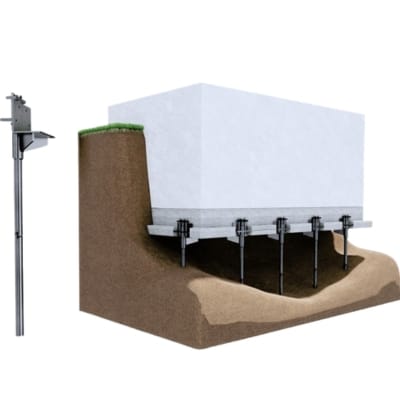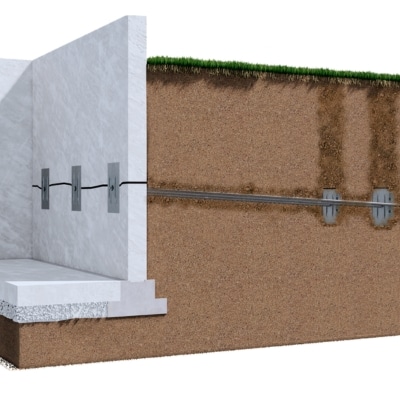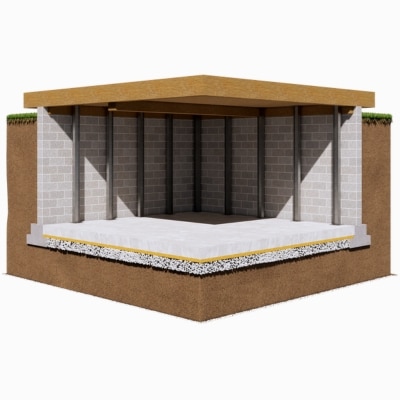Mortar Cracks
Mortar cracks can be indicators of potential foundation problems. These cracks may manifest in various forms, including hairline cracks, wider gaps, or separation between bricks or blocks. It’s essential to pay attention to these cracks as they can worsen over time, compromising the structural integrity of your home.

Mortar Crack Repair in Northern Virginia, Shenandoah Valley, North Central Virginia, and West Virginia
Mortar is the binding material that holds bricks and stones together in a masonry wall or foundation. Mortar cracks can serve as warning signs of underlying foundation problems.
These cracks can appear in the mortar joints between bricks, stones, or concrete blocks in your house. Understanding the significance of these cracks is crucial for homeowners to ensure the stability and safety of their structures.
If you’ve noticed cracks in the mortar of your home’s foundation, it’s important to take action promptly. Contact LUX Foundation Solutions today to schedule a free estimate for any necessary repairs.
Do These Mortar Cracks Signs Seem Familiar?
The symptoms
If you observe any of the following signs in the mortar of your home or commercial building, you’re likely dealing with gaps caused by foundation issues:
- Bulging or Displaced Mortar
- Interior Wall Cracks
- Gaps between your floor and wall
- Cracks and Doors or windows that won’t close properly
- Vertical or Stair-step cracking in your mortar
- Water intrusion
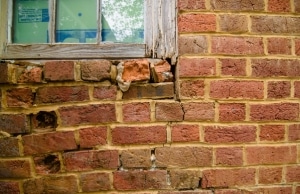
Bulging mortar
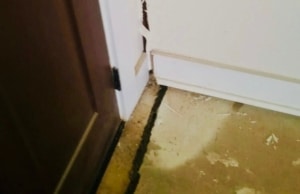
Cracks near a door frame
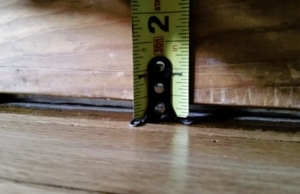
Gap between wall and floor
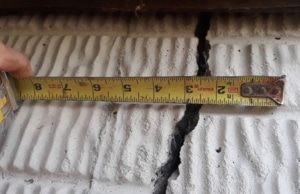
Vertical crack
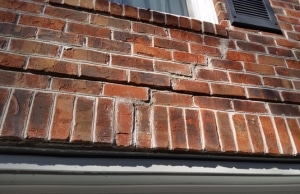
Stair-step crack
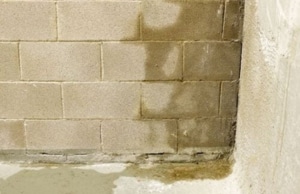
Water intrusion
What Causes Mortar Cracks?
Mortar cracks mostly occur due to the expansion and contraction of bricks around or the soil beneath the structure. Virginia experiences these issues due to the area’s climate changes and wide temperature ranges.
Some causes of mortar cracks include:
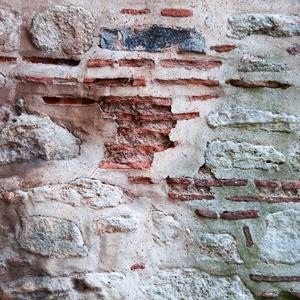
Freeze-thaw cycles
In cold climates, water can infiltrate masonry joints. When this water freezes, it expands, exerting pressure on the surrounding mortar. As the ice thaws, it contracts, which can lead to cracking in the mortar joints. This cycle, repeated over time, weakens the mortar and can compromise the structural integrity of the masonry. Proper maintenance, including sealing the masonry, can help protect against these effects.
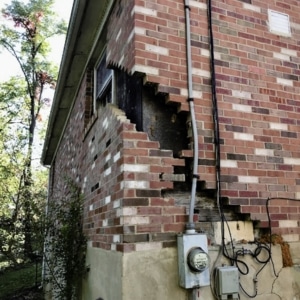
Foundation shifting and settling
Another reason for mortar cracks is when the foundation of your home moves or shifts. This can happen over time due to various factors, such as the soil underneath the foundation settling unevenly or the ground shifting. When the foundation moves, it can stress the mortar, leading to gaps.
Addressing the underlying foundation issues, which may include reinforcing or stabilizing the foundation, is essential to prevent further damage.
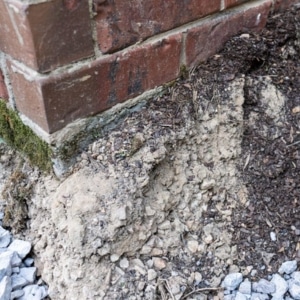
Erosion from precipitation
Rainwater can erode the mortar joints over time, especially if it is not adequately protected. Water infiltration can saturate the mortar, causing it to weaken and deteriorate. Implementing proper waterproofing measures and ensuring effective drainage around the foundation can help mitigate the impact of erosion.
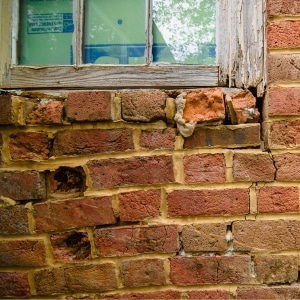
Aging mortar
As mortar gets older, it can start to deteriorate. Over time, exposure to the elements and natural wear and tear can cause it to crumble, becoming brittle and less capable of withstanding stress.
When the mortar becomes weak, gaps can develop, affecting the stability of your home’s structure.
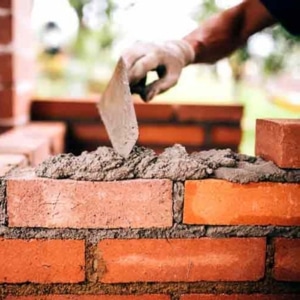
Improper construction or substrate
Mortar’s ability to bond effectively depends on proper mixing and application techniques, as well as the condition of the substrate (the surface it’s applied to). If it is not mixed correctly or is applied to a poorly prepared substrate, it may not adhere properly, leading to cracks.
Correct construction practices, including appropriate mixes and substrate preparation, are essential to ensure long-lasting mortar joints.
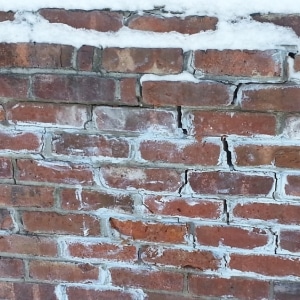
Temperature changes
Temperature changes, especially for walls directly exposed to the eliminates, can contribute to mortar cracks. When the sun shines on a wall, it can cause it to expand. Then, as the wall cools down, it contracts.
These constant cycles of expansion and contraction can result in cracking in the mortar joints. The use of expansion joints or control joints in the masonry can help accommodate these temperature-related movements and minimize the risk of gaps
Regardless of the cause, cracks in mortar can lead to serious foundation problems if left unaddressed. Let our experts at LUX Foundation Solutions diagnose the issue and provide you with the proper solution.
Our Solutions
To get rid of mortar cracks in your house, wall anchors are one of the solutions that can provide a long-term solution. Wall anchors are designed to stabilize and strengthen your home’s foundation, ultimately preventing future cracking in the mortar. By installing wall anchors, the weight of your home is distributed more evenly, reducing pressure on areas experiencing stress and strain.
Wall anchors also prevent further damage to your foundation, guaranteeing the safety of your home for years to come. Contact a professional foundation repair company like LUX Foundation Solutions to install wall anchors and protect your home from further damage.
You should be worried about cracks in mortar when they become severe enough to undermine the structural integrity of your home. Cracks that are wider than 5mm wide and corresponding gaps on the external wall or associated with other signs of foundation damage, such as sloping floors or sticking doors and windows, are red flags that require immediate attention. These gaps may be caused by foundation settlement or other structural problems.
A push pier system is one solution to address mortar cracks caused by foundation problems. Push piers are steel pipe sections hydraulically driven into the ground to support and stabilize the foundation. They provide a secure anchor that can lift and level the foundation, closing gaps. Push piers can stabilize foundation walls, repair structural damage, and prevent further deterioration.
Installing push piers involves excavating soil around the affected area, drilling a hole through the foundation’s footing, driving the pier sections into the ground, and then attaching them to the foundation with a steel bracket. The push piers are tested for capacity and adjusted to lift the foundation to its original position. Finally, the soil is backfilled, and the area is restored to its original condition. Push piers provide a permanent, reliable solution to cracks in mortar caused by foundation problems.
One solution LUX Team offers to prevent minor cracks in your house mortar from further cracking is carbon fiber reinforcement. Carbon fiber sheets or strips are applied to the wall to provide additional strength and support. The carbon fiber acts as a reinforcement that helps distribute the stress and prevents the gaps from widening.
The process involves cleaning and preparing the surface, applying an adhesive, and then adhering the carbon fiber sheets or strips to the wall. This reinforcement method is effective in preventing minor cracks from developing into larger, more significant issues.
Cracked mortar can indeed be a sign of severe foundation problems. When a foundation settles or shifts, it can create stress on the walls and cause the crack. This can also lead to gaps between the bricks and, in severe cases, weakened walls.
One solution to this is using I-Beams, which are steel beams that provide additional structural support to the foundation. The process involves installing the I-Beams into the foundation, which helps to distribute the weight of the house—providing additional support and preventing further cracking in the mortar. This solution is effective because it offers greater stability to the foundation and can help prevent more serious structural problems in the future.
Schedule a Free Foundation Cracks Repair Estimate with LUX Foundation Solutions Today!
Don’t let mortar cracks put your home at risk. At LUX Foundation Solutions, we understand that dealing with foundation problems can be stressful and overwhelming. That’s why we offer comprehensive solutions to fit your needs. From foundation repair services to basement waterproofing and crawl space repair, our team can tackle any issue and help you maintain a safe and stable home.
Don’t wait until it’s too late. Call us today at 540-508-8982 or fill out our online estimate request form to schedule a free, on-site foundation repair estimate. Let us help you keep your foundation in top shape as we proudly serve homeowners in Northern Virginia, Shenandoah Valley, North Central Virginia, West Virginia, and surrounding areas.
Request a free Estimate
FAQ's
If you notice cracks in the mortar of your home’s foundation, it is best to consult an expert foundation repair service. The severity of the gaps, their location, and the age of your home are all factors that can determine if they are a cause for concern. Cracks can be caused by various reasons, including weather, settling, or structural damage.
A professional inspection can accurately diagnose the underlying problem and provide the best action. Don’t delay seeking help to mitigate potential hazards and protect your investment.
Minor cracks in the mortar that only appear in certain areas of your home may still be evidence of a foundation problem and should not be ignored. Even if the gaps seem insignificant, they can indicate underlying issues. Foundation problems often manifest in localized areas before spreading to other parts of the home.
It is crucial to have a professional inspection to assess the severity of the situation and determine the appropriate course of action. Prompt attention to minor gaps can help prevent further damage and expensive repairs in the future.
To prevent cracks in mortar from becoming a bigger problem with your foundation, there are several proactive measures you can take:
- Ensure proper drainage around your home by directing water away from the foundation through gutters, downspouts, and grading. Regularly inspect and maintain your downspouts and gutters to prevent water accumulation near the foundation.
- Monitor and address any plumbing leaks promptly to prevent excess moisture. Implementing a consistent maintenance routine, including regular inspections, sealing of mortar joints, and addressing minor cracks promptly, can help mitigate the risk of more significant foundation problems.
- Consult a professional for expert advice and guidance on preventative measures specific to your home.
As a homeowner, it is essential to inspect your foundation periodically for signs of damage and wear, including cracks in the mortar. These structural issues can compromise the integrity of your foundation and its ability to support your home. Depending on your area’s climate and soil conditions, regular inspections may be required every six months to a year.
If you notice any signs of damage, it is crucial to seek the assistance of a professional foundation repair service to identify the underlying issues and perform necessary repairs promptly. Don’t wait until the problem becomes too severe and causes significant damage to your home. Act proactively and ensure the safety of your family and home with regular foundation inspections.

